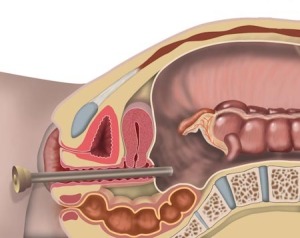
Transvaginal surgeries could mean
fewer incisions, quicker recovery times
A surgeon at Yale Medical Center in New Haven, Conn. removed a woman's gallbladder through her vagina last month, according to a statement from the hospital published Aug. 27.
The transvaginal cholecystectomy, performed by surgeon Kurt Roberts, MD, on a 21-year old woman, is one of only a handful of surgeries of its kind ever done in the United States, according to Yale. (See also DM 3800.)
Called Natural Orifice Translumenal Endoscopic Surgery, or NOTES, these operations involve entering the body through natural openings, such as the vagina or rectum. According to Dr. Roberts, these surgeries require few incisions, and can be virtually scar-free.



Ad Statistics
Times Displayed: 0
Times Visited: 0 Keep biomedical devices ready to go, so care teams can be ready to care for patients. GE HealthCare’s ReadySee™ helps overcome frustrations due to lack of network and device visibility, manual troubleshooting, and downtime.
"My holy grail when I started [practicing surgery]," Dr. Roberts tells DOTmed Business News, was to perform one without scars or visible incisions.
Dr. Roberts believes NOTES surgeries offer relatively pain-free recovery times. "What causes the pain [after the surgery] is the incisions on the abdomen," he says. "You cut through the skin, you cut through muscle. That's what's causing pain.... Usually you have pain scales between five or six one day after surgery," Dr. Roberts adds, but after NOTES procedures he claims his patients only register one or two on the scale of post-operative pain. "They go back to working [after] a day or two," he says, when typically patients return to work one or two weeks following abdominal surgeries.
While some doctors envision eventually performing translumenal surgeries through the mouth or rectum, Dr. Roberts thinks, for now, it's too risky. Transgastric surgeries -- cutting through the stomach to get to the abdominal cavity, which would be necessary for most oral NOTES surgeries - can cause dangerous post-op leakage, he says, although he adds that the procedure has been done successfully in India.
And Dr. Roberts thinks operating through the rectum would be even more troublesome. "They have high infection rates," he says of transrectal surgeries, which so far have only been done on pigs and other animals. "The rectum has the highest density [of bacteria] in the [body], so you have a hard time cleaning this area out," he says.
So, for the moment, only female patients can benefit from NOTES operations.
Dr. Roberts says that NOTES surgeries are especially safe when done through the vagina, because it is an acid environment naturally hostile to bacteria. "The vagina is sterile," he says. He adds that the surgery bypasses the uterus, so there is no risk to childbearing.
Currently, Dr. Roberts has only performed a "pure" NOTES procedure with appendectomies, preferring a hybrid laparoscopic-NOTES technique for gallbladder removal, in which he also makes incisions around the navel.
Although some "pure" NOTES cholecystectomies have been performed in India and Brazil, Dr. Roberts says he is concerned about their safety. The clip appliers used to close bile ducts are usually not long enough to reach the ducts from the vagina, he says, making the operation tricky. Dr. Roberts wants to wait until companies develop longer, more flexible tools before he would attempt such an operation.
According to the Natural Orifice Surgery Consortium for Assessment and Research (NOSCAR), an organization that promotes NOTES research, Dr. Roberts might not have long to wait. This summer, Olympus Medical pledged to invest $250,000 in the field, raising their total investments in NOTES research to $1.25 million, according to a statement from NOSCAR. Other companies pursuing this line of research are Covidien, Ethicon and Power Medical Interventions.
"People believe it's the next big thing," says Dr. Roberts.

